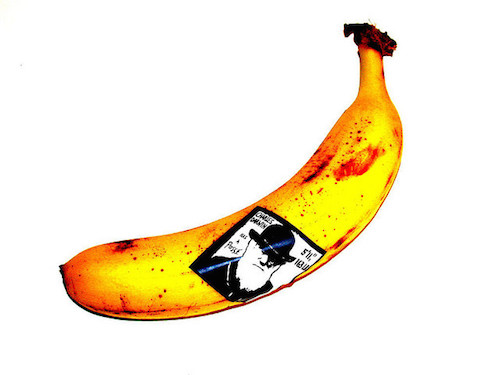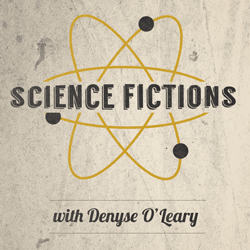 Culture & Ethics
Culture & Ethics
 Evolution
Evolution
Branding Popular Arts and Culture for Darwin

Evaluating the evidence to date, we can choose to see the human mind as something beyond a natural, material phenomenon (the traditional view) or as a randomly heightened natural phenomenon (the current "view from science"). If society thoroughly adopts the "view from science" approach, whose origin is Darwinian evolution theory, how will we re-vision areas like personal relationships, business, and the arts? Fortunately, we needn’t guess.
Personal Relationships
Evolutionary psychology hit the advice column circuit in 2010. Britain’s Guardian newspaper burbled proudly that a new columnist would shine the "cold light" of evolutionary psychology on readers’ problems, via lore from the study of apes and monkeys.
A mere 150 years after Darwin published On the Origin of Species, we are proud to introduce our very own Evolutionary Agony Aunt in the person of Carole Jahme, author of Beauty and the Beasts: Woman, Ape and Evolution and star of the comedy Carole Jahme is Sexually Selected, described as a combination of Charles Darwin and Charlie Chaplin.
 Jahme’s advice is not always bad. But wherever it is good, a sensible adult with no knowledge, belief, or interest in evolution might have said the same. And some information Jahme gleans from evo psych would strike a mature reader as just wrong. For example, we learn, "Young children have opinions — they are wired for survival and will ask for changes that benefit themselves." In reality, children ask for whatever they want, not what benefits them. That is why they have parents.
Jahme’s advice is not always bad. But wherever it is good, a sensible adult with no knowledge, belief, or interest in evolution might have said the same. And some information Jahme gleans from evo psych would strike a mature reader as just wrong. For example, we learn, "Young children have opinions — they are wired for survival and will ask for changes that benefit themselves." In reality, children ask for whatever they want, not what benefits them. That is why they have parents.
Indeed, the hand of popular culture is far more evident in the series than are the paw prints of common ancestors. In virtually every case, Jahme’s advice would be more relevant and concise if she just left out the ritual padding about chimps, bonobos, etc. The light of evolutionary psychology shines not so much cold as dim.
The Guardian no longer runs the column, but its message endures in many forms: Naturalist irrelevancies are genuine insight, so we must live by their cold dim lights.
Darwinian Brand Marketing
The famed early American capitalists have often been portrayed as social Darwinists. But, as John West shows in Darwin Day in America (2007), they were typically uneducated men whose frontiersman innovativeness was later interpreted as social Darwinism. Their actual commitments may more have resembled Henry Ford’s aspiration to build a car that his autoworkers could afford to buy and drive, as his own road to fame and fortune.
However that may be, Darwinian evolution thinking has certainly affected the rhetoric of pop business writing. Consider Sally Hogshead, a self-described Darwinian brand marketing specialist and author of Fascinate: Your 7 Triggers to Persuasion and Captivation (Harper Business, 2010). She argues from studies of neuroscience and ape behavior that seven evolutionary triggers can get us to pay more than we need to for goods and services. She begins (following a convention of evolutionary psychology) by undermining the idea that we understand what we think:
Whatever you’re drawn to — from watching reruns of Family Guy to spending time with your family — you have the triggers to thank for it. (p. 17)
She is quite happy to market lust (it "conquers the rational evaluation process, freeing us to stop thinking and start feeling," p. 73) and vice ("a little goes a long way, so customize your message by using it in combination with other triggers," p. 151). And she markets snobbery fearlessly. Keeping products unavailable to lower income people is, in her view, a key to commercial success:
Not so long ago, the height of epicurean indulgence was a gold box filled with Godiva chocolates. … Then, in an effort to expand, in 1999 Godiva made a fateful decision to distribute in mass retailers such as Barnes & Noble. The chocolates, which for the first time now included preservatives, were no longer a treat to be craved and desired. Now you could buy the gold box in strip malls. (Strip malls!) (p. 79)
Who decided that poorer people didn’t deserve a treat now and then? The most successful retailers in North America are proud to put luxury chocolates in lower income shopping carts. That, not creating scarcity, is the classic American model of business. In a world traditionally governed by class-conscious aristocracies who restricted access to luxuries or even benefits (often by law as well as custom), the American model revolutionized living standards. Hogshead competently (but unintentionally) demonstrates how Darwinism, if applied to economics or business, might create scarcity instead by restricting benefits to life’s winners — who can pay more.
Arts and Humanities
Naturalism’s long march through the institutions was bound to arrive at the arts, already in disarray. Morgan Meis informs us at The Smart Set that "Twenty percent of art can now be explained by neuroscience," according to a top neuroscientist — who arrived at his conclusion while studying seagull chicks. Meanwhile, "Darwinian" literary criticism has become a vigorous cottage industry, though set back somewhat by the recent death of one of its champions, Denis Dutton (1944-2010), founder of Arts and Letters Daily. That said, there has been vigorous pushback from thoughtful humanities champions such as Roger Scruton.
With good reason. If the humanities are merely the random emissions of a big-brained primate, the entire tradition as commonly understood is of no more value than recorded noise from a local animal sanctuary. Most critics of "Western civ" have never wanted to go so far as that — yet naturalism compels the conclusion. That is possibly why many critics of the trend toward naturalizing the arts are non-naturalist atheists.
A more recent and more thorough invasion is the attempt to create art that explicitly cites naturalist and Darwinian doctrines. The most ambitious venture so far may be New York Times columnist David Brooks’s 2011 novel, The Social Animal, about an evolutionarily happy couple. Brooks seems a recent convert to evo psych, to judge from his own 2009 views. At any rate, here is a sample passage:
Harold and Erica got their first glimpse of each other in front of a Barnes & Noble. They smiled broadly as they approached, and a deep, primeval process kicked in. Harold liked what he saw, from the waist-to-hip ratio to the clear skin, all indicative of health and fertility. He enjoyed the smile that spread across Erica’s face, and unconsciously noted that the end of her eyebrows dipped down. The orbicularis-oculi muscle, which controls this part of the eyebrow, cannot be consciously controlled, so, when the tip of the eyebrow dips, that means the smile is genuine, not fake.
Erica was impressed by him: women everywhere tend to prefer men who have symmetrical features and are slightly older, taller, and stronger than they are. But she was more guarded and slower to trust than Harold was. That’s in part because, while Pleistocene men could pick their mates on the basis of fertility cues discernible at a glance, Pleistocene women faced a more vexing problem. Human babies require years to become self-sufficient, and a single woman in that environment could not gather enough calories to provide for a family. She was compelled to choose a man not only for insemination but for continued support.
Brooks’s evo psych version of socialist realism might appeal to modern urban naturalists without illuminating the human past in any meaningful way. As David A. Puts observes in Evolution and Human Behavior, "Literature in evolutionary psychology suggests that mate choice has been the primary mechanism of sexual selection in humans, but this conclusion conforms neither to theoretical predictions nor available evidence." That is because, in most ancient, survival-conscious societies for which we have much genuine information, both men and women married the partners their families chose (men had somewhat more freedom to scout). They may not even have met them before the wedding, and neither sex was typically allowed the sort of easy market appraisal Brooks describes from his own culture above.
But naturalism’s faux culture history is gladly heard in high places, where history is negotiable. John Gray, emeritus professor of European thought at the London School of Economics, comments:
The political appeal of Brooks’s book The Social Animal has been nowhere more pronounced than in Britain, where the youthful David Cameron leads a rebranded Conservative Party in a coalition government. Having instructed all members of his cabinet to read this best seller, Cameron then sought the author’s counsel when Brooks was promoting the book in the UK. … Not to be left on the sidelines, the Labour opposition leader, Ed Miliband, also met the writer.
In general, like all naturalist enterprises, evolutionary psychology doesn’t so much aspire to shed light on culture as to rebrand it as an outcome of natural selection acting on random mutation (Darwinism). And if the naturalist brand is the one to own, governments might indeed want a piece of it.
But culture areas like relationships counseling, business, and arts/humanities are mere toys. As we shall see, naturalists buzz obsessively around the Really Big Idea prizes like compassion (altruism), free will, morality, politics, and religion.
Editor’s note: Here is the "Science Fictions" series (the human mind) to date at your fingertips (the human mind).
